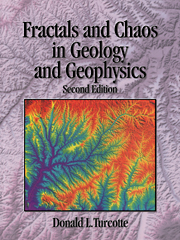Book contents
- Frontmatter
- Contents
- Preface
- Preface to the second edition
- 1 Scale invariance
- 2 Definition of a fractal set
- 3 Fragmentation
- 4 Seismicity and tectonics
- 5 Ore grade and tonnage
- 6 Fractal clustering
- 7 Self-affine fractals
- 8 Geomorphology
- 9 Dynamical systems
- 10 Logistic map
- 11 Slider-block models
- 12 Lorenz equations
- 13 Is mantle convection chaotic?
- 14 Rikitake dynamo
- 15 Renormalization group method
- 16 Self-organized criticality
- 17 Where do we stand?
- References
- Appendix A Glossary of terms
- Appendix B Units and symbols
- Answers to selected problems
- Index
Preface to the second edition
Published online by Cambridge University Press: 05 June 2012
- Frontmatter
- Contents
- Preface
- Preface to the second edition
- 1 Scale invariance
- 2 Definition of a fractal set
- 3 Fragmentation
- 4 Seismicity and tectonics
- 5 Ore grade and tonnage
- 6 Fractal clustering
- 7 Self-affine fractals
- 8 Geomorphology
- 9 Dynamical systems
- 10 Logistic map
- 11 Slider-block models
- 12 Lorenz equations
- 13 Is mantle convection chaotic?
- 14 Rikitake dynamo
- 15 Renormalization group method
- 16 Self-organized criticality
- 17 Where do we stand?
- References
- Appendix A Glossary of terms
- Appendix B Units and symbols
- Answers to selected problems
- Index
Summary
A large number of new results on fractals, chaos, and self-organized criticality applied to problems in geology and geophysics have appeared since the first edition of this book was published in 1992. Evidence for this comes from the large number of new references included in this edition, increasing from 160 to over 500. Because of the rapid advances in knowledge it became evident shortly after the publication of the first edition that a second edition would be required in a few years.
A large number of additions and some deletions have been made in preparing this second edition. In Chapter 2 a comprehensive treatment of the completeness of the sedimentary record has been used to introduce the application of fractal techniques to geological problems. To make this textbook more complete, a brief introduction to probability and statistics has been included in Chapter 3. Chapter 4 on seismicity and tectonics has been extensively revised to include the work that has been recently carried out on the spatial distributions of earthquakes and fractures. In Chapter 5 the elegant work by Claude Allègre and his associates explaining power-law (fractal) distributions of mineral deposits has been added.
A major addition to the second edition is the comprehensive treatment of multifractals in Chapter 6. Also added to this chapter on fractal clustering are pair-correlation techniques and lacunarity. One of the most extensive revisions concerns the treatment of self-affine fractals in Chapter 7.
- Type
- Chapter
- Information
- Fractals and Chaos in Geology and Geophysics , pp. xi - xiiPublisher: Cambridge University PressPrint publication year: 1997



